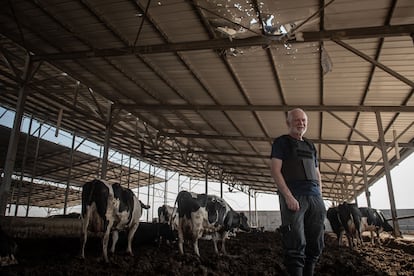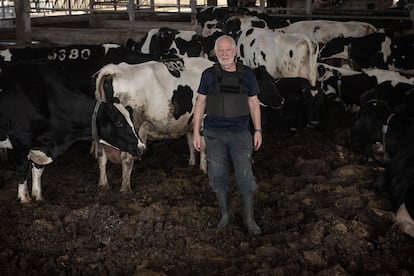The last resident in Nirim holds out under Gaza rockets in a ghost kibbutz
An Israeli of Argentine origin remains at the head of a cooperative dairy farm, caring for more than 600 cows. The rest of the residents fled following the Hamas attack

“If it weren’t for the cows, I would have left too,” admits Marcelo Wasser. “We have lost our personal security. The army came very late,” he recalls, in reference to the morning of October 7, when 50 Hamas militants attacked the kibbutz of Nirim, killing five and kidnapping four others. Dressed at all times in a protective anti-shrapnel vest, Wasser is the only one of the kibbutz’s 500 inhabitants who have stayed to run the dairy farm. The 65-year-old cares for more than 600 Holstein cows and about 350 calves. Nirim, located 84 miles south of Tel Aviv, is now a war zone, a closed military perimeter with tanks and artillery lined up at its entrances.
“I had never thought about going to live in Tel Aviv or anywhere else, not even in the slightest,” says Wasser, who was born in Buenos Aires but left the country when he was 18 years old after the 1976 military coup. “I had never been afraid In Israel. I never thought this could happen. Before, rockets fell from time to time,” he says, recalling previous conflicts in the Gaza Strip, “but a massive massacre, like the one that occurred at the Supernova music festival, 15 kilometers [nine miles] from this kibbutz, was inconceivable.”
“We are living in fear,” says Wasser, a veteran soldier of the 1982 Lebanon war. “At my age, I’m thinking that maybe it’s time to retire and start another life after more than 40 years on the dairy farm. But I’m not going to decide anything until this war ends.” Wasser, the manager of the farm, begins talking in the main office on the first floor of the farm’s main building, but says it’s better to move closer to the air raid shelter, a reinforced concrete igloo in the outside courtyard.
Eight minutes into the conversation, the alarm on his cellphone goes off, while a red light flashes. “We have 10 seconds, more like eight. We are less than two kilometers [1.2 miles] from the Gaza border,” he warns, as he heads steadily towards the shelter. Shortly after, several sharp bangs are heard dozens of meters away.
This has become routine for Wasser, who says he is undecided about whether he should remain at the kibbutz or opt for change. “Life is like this now, under the bombs, we have just seen it. For me, I run between five and 10 times to the shelter a day,” he explains. “At the kibbutz, the owner of the cooperative farm asked me to stay. It’s a pretty delicate topic for me. In the situation we are in, I am wondering if I should start another life with my wife, who is retired at 62 years old and also of Argentine origin.”
Wasser arrived at this end of the Gaza border after dropping medical studies at the age of 18 to carry out aliyah, the immigration of Jews from the diaspora to the state of Israel (the 1957 Law of Return gives all diaspora Jews the right to relocate to Israel and acquire Israeli citizenship). He was put to clean manure on the kibbutz farm and, after serving in the military as a stretcher bearer for almost three years, he studied economics and joined the management of the cooperative. He has now been managing Nibin for three decades. “Those were other times, of collective effort. Now everything has been privatized,” he says.
“In Israel, kibbutzim with farms were set up in border areas for strategic reasons,” he explains. “When you have animals in your care, you can’t move as easily and are less likely to leave. The cows can’t run away, and the population settles,” he explains with a wink. He highlights the strong ties of mutual support in the kibbutz when it comes to collectively covering the costs of education and health. “We maintain a high degree of solidarity. Before we contributed 36% of our salary to the common fund, now the contribution for community services is limited to 2,500 shekels [about $640] per family per month.”
“This dairy farm is my life, but a month ago I was about to lose it right here,” he says while shaking his head. “On October 6 we celebrated the 78th anniversary of the founding of the kibbutz. Two of my children and one of my grandchildren came to spend the Sabbath night with me,” he recalls. At 6:30 a.m., the anti-aircraft alarms were activated. “We are used to it. We went down to the safe room in my house. But it was striking, projectiles kept falling.”
Calls for help
The Thai farmworkers on the kibbutz warned him. “I got on the electric golf cart that I use to get around the kibbutz,” he says. There were a dozen dead cows and many others injured, so he told the Asian employees to hide in the shelter with water and food and returned home. We still didn’t know what was happening. Then he connected his cell phone and began to realize what was happening in Nirim.
“Something extraordinary happened to me. Inside my head, I heard the voices of the calls for help that I read in the text messages,” he remembers. “They said: Please send help. Let the security officers come. They are shooting at my house. They want to break the door of the safe room. They are burning it. Smoke is coming in.”

“Later we learned that there were 50 terrorists loitering in Nirim. We hid for almost 12 hours, until the army took us out,” he says. In the nearby Nir Oz kibbutz, home to 400 people, one in four was declared dead or missing. Among the more than 5,000 young people who danced at dawn at the Supernova music festival, where hundreds were killed and dozens kidnapped.
In Nirim, only Marcelo Wasser remains. He takes turns managing the farm with his deputy, so he can rest a few days a week with his wife, in an apartment in the Tel Aviv area that his friends have loaned him. On the periphery of the compound, along with the troops, there is also a person in charge of relations between the kibbutz and the army, who has planted checkpoints and barricades on the roads in the area.
When asked if he is considering returning to Argentina, he jokes: “No, there is a lot of security there. I will stay in Israel, but in another place.” Wasser says that he only remains on the dairy farm “out of professionalism and responsibility,” and “because of the volunteers who come from the cities to help.” “They are risking their lives. Me too,” he concludes somberly. “But they come for a few days and leave, and I’m here almost all the time.”
Nirim was a kibbutz of the Zionist left. “I also thought that peace was possible. I voted in 1992 for the Meretz party [pacifist left] to support Labor’s Isaac Rabin’s plan for the Oslo Accords. Now I feel like I’ve been betrayed. But it’s not like that. Apparently, I was wrong,” he says. “With Hamas, nothing can be done now, they can only be eliminated.”
He adds: “With the Palestinian National Authority it may be possible. I do business with Palestinians from the West Bank. I sell them cows. They ask me for advice for their projects. But after what happened, trust has been broken. I argued before with many Israelis, defending that peace must be given a chance. But on October 7, they came to the kibbutz to kill people.”
“This is the most difficult situation of my life,” he continues. “You can’t live with that fear. I no longer know if I will find a gun pointed at me when I return home.”
Sign up for our weekly newsletter to get more English-language news coverage from EL PAÍS USA Edition
Tu suscripción se está usando en otro dispositivo
¿Quieres añadir otro usuario a tu suscripción?
Si continúas leyendo en este dispositivo, no se podrá leer en el otro.
FlechaTu suscripción se está usando en otro dispositivo y solo puedes acceder a EL PAÍS desde un dispositivo a la vez.
Si quieres compartir tu cuenta, cambia tu suscripción a la modalidad Premium, así podrás añadir otro usuario. Cada uno accederá con su propia cuenta de email, lo que os permitirá personalizar vuestra experiencia en EL PAÍS.
¿Tienes una suscripción de empresa? Accede aquí para contratar más cuentas.
En el caso de no saber quién está usando tu cuenta, te recomendamos cambiar tu contraseña aquí.
Si decides continuar compartiendo tu cuenta, este mensaje se mostrará en tu dispositivo y en el de la otra persona que está usando tu cuenta de forma indefinida, afectando a tu experiencia de lectura. Puedes consultar aquí los términos y condiciones de la suscripción digital.









































